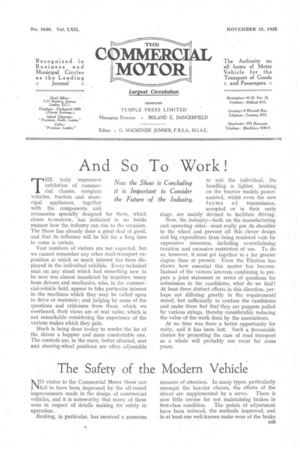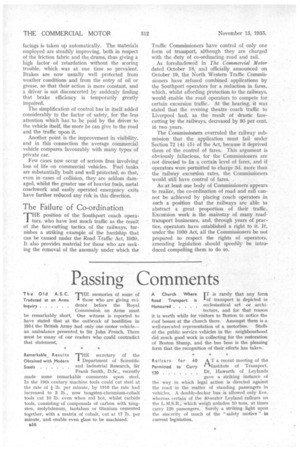The Safety of the Modern Vehicle
Page 41

Page 42

If you've noticed an error in this article please click here to report it so we can fix it.
NO visitor to the Commercial Motor Show can fail to have been impressed by the all-round improvements made in the design of commercial vehicles, and it is noteworthy, that many of these were in respect of details making for safety in operation.
Braking, in particular, has received a generous measure of attention. In many types, particularly amongst the heavier classes, the efforts of the driver are supplemented by a servo. There is now little excuse for not maintaining brakes in first-class condition. The points of adjustment have been reduced, the methods improved, and in at least one well-known make wear of the brake facings is taken up automatically. The materials employed are steadily improving, both in respect of the friction fabric and the drums, thus giving a high factor of retardation without the scoring trouble, which was at one time so prevalent. Brakes are now usually well protected from weather conditions and from the entry of oil or grease, so that their action is more constant. and a driver is not disconcerted by suddenly finding that brake efficiency is temporarily greatly impaired.
The simplification of control has in itself added considerably to the factor of safety, for the less attention which has to be paid by the driver to the vehicle itself, the more he can give to the road and the traffic upon it.
Another point is the improvement in visibility, and in this connection the average commercial vehicle compares favourably with many types of private car.
Few cases now occur of serious fires involving loss of life on commercial vehicles. Fuel tanks are substantially built and well protected, so that, even in cases of collision, they are seldom damaged, whilst the greater use of heavier fuels, metal coachwork and easily operated emergency exits have further reduced any risk in this direction.
The Failure of Co-ordination
THE position of the Southport coach operators, who have lost much traffic as the result of the fare-cutting tactics of the railways, furnishes a striking example of the hardship that can be caused under the Road Traffic Act, 1930. It also provides material for those who are seeking the removal of the anomaly under which the Traffic Commissioners have control of only one form of transport, although they are charged with the duty of co-ordinating road and rail.
As foreshadowed in The Commercial Motor dated October 18, and officially announced on October 19, the North Western Traffic Commissioners have refused combined applications by the Southport operators for a reduction in fares, which, whilst affording protection to the railways, would enable the road operators to compete tor certain excursion traffic. At the hearing, it was stated that the evening theatre coach traffic to Liverpool had, as the result of drastic farecutting by the railways, decreased by 95 per cent. in two years.
The Commissioners overruled the railway submission that the application must fail under Section 72 (4) (5) of the Act, because it deprived them of the control of fares. This argument is obviously fallacious, for the Commissioners are not directed to fix a certain level of fares, and if operators were permitted to charge 3d. more than the railway excursion rates, the Commissioners would still have control of fares. , As at least one body of Commissioners appears to realize, the co-ordination of road and rail cannot be achieved by placing coach operators in such a position that the railways are able to abstract a great proportion of their traffic. Excursion work is the mainstay of many roadtransport businesses, and, through years of practice, operators have established a right to it. If, under the 1930 Act, all the Commissioners be not prepared to respect the rights of operators, amending legislation should speedily be introduced compelling them to do so.






















































































































